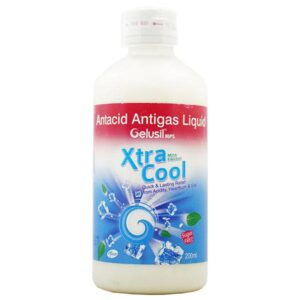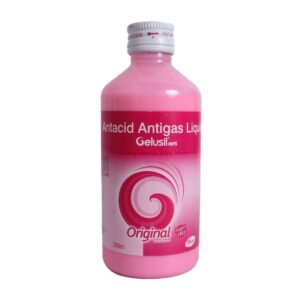SORBITOL + MG(OH)2 + DRIED AL(OH)3 + DIMETHICONE
Sorbitol: Sorbitol is a sugar alcohol used as a laxative to relieve occasional constipation. It can also be used to empty the bowels before certain medical procedures.
The mechanism of action of Sorbitol is osmotic. When taken orally, it draws water into the large intestine, softening the stool and increasing bowel movement frequency. This helps to relieve constipation.
The typical dose of Sorbitol for adults is 30-150 mL (2-10 tablespoons) diluted in 120-240 mL (4-8 fluid ounces) of water, juice, or another beverage. It is important to drink plenty of fluids while using Sorbitol to prevent dehydration.
Common side effects of Sorbitol include mild nausea, stomach cramps, and diarrhea. These side effects are usually temporary and resolve after the drug is no longer being used. However, if diarrhea persists or becomes severe, it is important to consult a healthcare professional.
It is important to note that Sorbitol should not be used by individuals who are allergic to it or have a bowel obstruction. Sorbitol should also be used with caution in individuals with diabetes, as it can affect blood glucose levels. It is always recommended to consult a doctor or pharmacist before starting any new medication.
Mg(oh)2: The drug Mg(oh)2, also known as magnesium hydroxide, is primarily used as an antacid and laxative. It is commonly sold under the brand names Milk of Magnesia, Phillips’ Milk of Magnesia, and Ex-Lax Milk of Magnesia.
As an antacid, Mg(oh)2 works by neutralizing excess stomach acid, providing relief from heartburn, acid indigestion, and sour stomach. It can also be used to treat symptoms associated with gastroesophageal reflux disease (GERD) and gastric ulcers.
Mechanism of action:
When Mg(oh)2 reacts with stomach acid (HCl), it forms water (H2O) and magnesium chloride (MgCl2). This reaction helps to reduce the acidity in the stomach, providing a soothing effect on the esophageal and gastric lining.
Dose:
The recommended dose of Mg(oh)2 varies depending on the condition being treated. As an antacid, the usual adult dose is 800-2400 mg (2-4 teaspoons) taken orally 1-3 times per day, as needed for relief. For constipation, the usual adult dose is 2400-4800 mg (1-2 teaspoons) taken orally once daily or as directed by a healthcare professional.
It is important to always follow the instructions provided by the healthcare provider or the product label when taking Mg(oh)2.
Side effects:
Mg(oh)2 is generally considered safe when used as directed. However, some individuals may experience side effects, which can include:
1. Diarrhea: Excessive use of Mg(oh)2 can lead to diarrhea, which can cause dehydration and electrolyte imbalances. It is essential to drink plenty of fluids when taking this medication.
2. Upset stomach and nausea: Some individuals may experience mild stomach discomfort, bloating, and nausea.
3. Hypomagnesemia: Prolonged or excessive use of Mg(oh)2 can lead to low levels of magnesium in the body, a condition known as hypomagnesemia. Symptoms of hypomagnesemia may include muscle cramps, irregular heartbeat, fatigue, and weakness.
4. Interaction with medications: Mg(oh)2 can interact with certain medications, including antibiotics and anticoagulants. It is important to inform the healthcare provider about all the medications being taken to avoid potential interactions.
It is advisable to consult a healthcare professional or pharmacist for more specific information regarding the use, dosage, and potential side effects of Mg(oh)2, especially if you have any underlying medical conditions or are taking other medications.
Dried Al(oh)3: Dried Al(oh)3 is the common abbreviation for dried aluminum hydroxide. It is used as an antacid and phosphate binder in the treatment of conditions such as heartburn, gastroesophageal reflux disease (GERD), and kidney disease.
The exact mechanism of action of Dried Al(oh)3 is not fully understood, but it is believed to work by neutralizing excess stomach acid. It reacts with hydrochloric acid in the stomach to form aluminum chloride and water. This reaction helps to increase the pH level in the stomach, reducing symptoms of acid reflux and indigestion.
The dose of Dried Al(oh)3 varies depending on the condition being treated. For heartburn and indigestion, the typical starting dose is 400-600 mg, taken after meals and at bedtime. The dose can be adjusted based on individual needs, but it is important not to exceed the maximum recommended dose of 4200 mg per day.
As with any medication, Dried Al(oh)3 can cause side effects. Common side effects may include constipation, diarrhea, abdominal discomfort, and flatulence. Rarely, it may cause more serious side effects such as allergic reactions, including skin rash, itching, swelling, or difficulty breathing. Long-term use of Dried Al(oh)3 may also lead to accumulation of aluminum in the body, potentially causing problems with kidney function.
It is important to consult with a healthcare professional before using Dried Al(oh)3, as they can provide guidance on dosing and monitor for any potential side effects or drug interactions.
Dimethicone: Dimethicone is a medication that belongs to the class of drugs known as antifoaming agents. It is primarily used as an over-the-counter relief for symptoms associated with excess gas in the stomach and intestines, such as bloating, belching, and flatulence.
The mechanism of action of dimethicone involves reducing the surface tension of gas bubbles in the gastrointestinal tract. This helps to break down the bubbles, allowing gas to be expelled more easily. Dimethicone does not get absorbed into the bloodstream and has no systemic effect on the body.
The recommended dose of dimethicone varies depending on the individual and the severity of symptoms. Generally, it is advised to take 40 to 125 mg, up to four times daily, after meals and at bedtime. It is important to carefully follow the instructions provided on the product label or as directed by a healthcare professional.
Dimethicone is generally well-tolerated and has few reported side effects. Some individuals may experience mild gastrointestinal discomfort, such as nausea or diarrhea. Allergic reactions to dimethicone are rare but possible. If any unusual or severe side effects occur, it is advisable to seek medical attention.
It is important to note that dimethicone may interact with certain medications, such as those used to treat heartburn or acid reflux. Therefore, it is recommended to consult with a healthcare professional before using dimethicone if you are taking any other medications.
Overall, dimethicone is a widely available and relatively safe medication for relieving symptoms of excess gas. However, it is always important to read and follow the instructions provided with the product and consult a healthcare professional if you have any concerns or questions.


